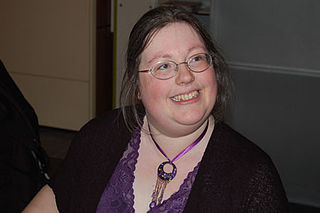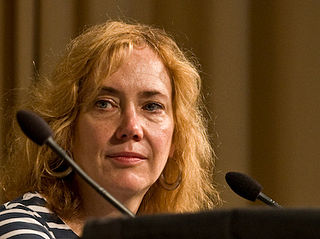A Quote by Tansy Rayner Roberts
One of the most interesting things about science fiction and fantasy is the way that the genres can offer different perspectives on matters to do with the body, the mind, medical technology, and the way we live our lives.
Quote Topics
Medical
Science
Technology
About
Body
Different
Different Perspective
Different Perspectives
Fantasy
Fiction
Genres
Interesting
Interesting Thing
Interesting Things
Live
Lives
Matters
Medical Technology
Mind
Most
Most Interesting
Offer
Our
Our Lives
Perspectives
Science Fiction
Science Fiction And Fantasy
Things
Way
Related Quotes
Science fiction is fantasy about issues of science. Science fiction is a subset of fantasy. Fantasy predated it by several millennia. The '30s to the '50s were the golden age of science fiction - this was because, to a large degree, it was at this point that technology and science had exposed its potential without revealing the limitations.
If I would had been born years earlier, I would have been in all the Westerns. It's just the way that the industry goes. But now, we are in an age of a lot of different kinds of fears, and you have the science fiction and horror genres doing our morality plays the same way that they would have done in Westerns. I absolutely accept it. In every respect, fantasy is like doing abstract paintings.
To those who think that all this sounds like science fiction, we point out that yesterday's science fiction is today's fact. The Industrial Revolution has radically altered man's environment and way of life, and it is only to be expected that as technology is increasingly applied to the human body and mind, man himself will be altered as radically as his environment and way of life have been.
Realizing that our minds control our bodies while our bodies reflect our minds amounts to understanding the most fundamental aspects of ourselves. It further equals a comprehension of the relationship between our "tools." And since the mind and body are interrelated, this understanding makes it easier to see why coordinating them is a practical way of using these tools to greatest effect-a way of using the mind and body to live our lives as art.
'Filk' is the folk music of the science fiction and fantasy community - you get parodies, you get traditional music that's had the words slightly modified, and you'll also get just original works that have been written about science fiction and fantasy works, or with science fiction and fantasy themes.
It's really interesting to just look at the career of a musician and a producer that went into many different genres and many different styles and many different places but always breaking the barriers between genres and at some point reinventing himself all along the way but also inventing things at the same time.
Science fiction is a weird category, because it's the only area of fiction I can think of where the story is not of primary importance. Science fiction tends to be more about the science, or the invention of the fantasy world, or the political allegory. When I left science fiction, I said "They're more interested in planets, and I'm interested in people."
"Hard" science fiction probes alternative possible futures by means of reasoned extrapolations in much the same way that good historical fiction reconstructs the probable past. Even far-out fantasy can present a significant test of human values exposed to a new environment. Deriving its most cogent ideas from the tension between permanence and change, science fiction combines the diversions of novelty with its pertinent kind of realism.
One of the interesting things about the ancient Greeks is that they really didn't have our conception of individual rights. They didn't have our conception of all lives matters. And it was really was true for them, that certain lives matter a lot more than others. It didn't dawn on them that all lives, although different, can be lives of equal mattering. And that is actually something a huge ethical lesson.
I define science fiction as the art of the possible. Fantasy is the art of the impossible. Science fiction, again, is the history of ideas, and they're always ideas that work themselves out and become real and happen in the world. And fantasy comes along and says, 'We're going to break all the laws of physics.' ... Most people don't realize it, but the series of films which have made more money than any other series of films in the history of the universe is the James Bond series. They're all science fiction, too - romantic, adventurous, frivolous, fantastic science fiction!




































